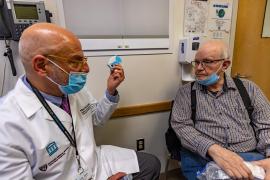Both Parties Gear Up For Long-Lasting Battle Over Health Overhaul Message
Democrats and Republicans are preparing for a long political battle that will turn on the ramifications of health reform.
The Wall Street Journal: "The president and congressional Democrats will take their victory lap at a Washington signing ceremony Tuesday. Mr. Obama will then launch his effort to sell the new $940 billion health-care law to a skeptical electorate Thursday at an event in Iowa." But the political risk continues for Democrats, and "Republicans intend to make every effort to exploit in this fall's election. No Republican voted for the main bill that passed the House Sunday night on a 219-to-212 vote, nor for a companion bill to make changes to the first bill. Thirty-four Democrats opposed the main bill and 33 voted against the second one" (Weisman, 3/23).
The Washington Post: "Other issues, such as the economy, may loom larger by November than the heated debate that has raged for more than a year over Obama's health-care initiative. But health care will become a proxy, say strategists in both parties, for the continuing debate over whether the Obama era represents a return to bigger and more intrusive government" (Balz, 3/23).
In a separate story, The Wall Street Journal reports on a few Democratic lawmakers whose reelection could be threatened in the November elections after their votes on health care reform. "A number of surveys circulated by Republicans in recent days have suggested vulnerable Democrats - such as [Rep. Betsy] Markey in Colorado and Rep. John Boccieri (D., Ohio), whose districts lean toward the GOP - put their jobs in jeopardy by voting with Democratic leaders to support the health overhaul. Meantime, Rep. Jason Altmire (D., Pa.) upset supporters by voting against the bill. But there were also signs that the vast bulk of voters would focus elsewhere in November's midterm elections. Much like gay marriage, health care may prove to be far more important in energizing people who are already politically active than the typical voter. The economy, by contrast, could remain a more overwhelming motivator" (Simon, Belkin and Maher, 3/23).
Roll Call
: "For a trio of House Members in competitive Senate races this fall, Sunday's passage of health care reform may end up being a watershed moment in their campaigns, as all three cast votes that run counter to the traditional political leanings of their home states. Between now and November the health care vote is likely to factor prominently into the races being run by Reps. Brad Ellsworth (D-Ind.), Mike Castle (R-Del.) and Mark Kirk (R-Ill.)" (Toeplitz, 3/23).
But, The Hill reports that Democrats are sure to ride a political wave with the vote. "The party in control of the White House generally loses seats in a midterm election and Democrats have plenty of vulnerable members. Still, they hope they can gain momentum and stem off significant losses this fall, bolstered by a huge legislative accomplishment they believe they can sell to the public. Democratic lawmakers and strategists acknowledge their political fortunes rest on the economy, where at least on the short term, the party has some reason for optimism" (Bolton, 3/22).
The New York Times
: "With Sunday's vote, the persistent Republican assertion that Democrats were cutting their own political throats has now devolved into hundreds of individual campaigns of persuasion. One by one, they will determine who controls Congress in 2011 and whether the changes enacted this week will endure beyond the next session. In districts that swing between the parties, the health care debate may define campaigns in a way that isolated votes on domestic policy rarely do."
The Times uses the example of Rep. Allen Boyd, D-Fla., "a seven-term incumbent and stalwart of the Blue Dog Coalition, [who] cast his vote with President Obama, who lost this district by nine percentage points in 2008. Mr. Boyd, who did not respond to requests for an interview, said in a lengthy statement that the health care legislation was not perfect. But he said he was convinced it would 'effectively curb the skyrocketing cost of health care' and 'successfully reduce the deficit more than any other policy enacted since 1993.' A number of his constituents, however, said they needed to hear more about what precisely had changed since November, when he voted no and said the House bill 'simply falls short when it comes to lowering health care costs'" (Sack, 3/22).
The New York Times, in a separate story, reports that after the Dems' health bill victory Republicans are now even less likely to cooperate and "Democrats themselves may be skittish, said Chris Jennings, a health care industry consultant who advised President Bill Clinton and was in the House chamber for Sunday night's vote. 'Every victory replenishes capital,' Mr. Jennings said, though he added that there seemed to be little appetite among Democrats on Capitol Hill for another brutal fight. 'I doubt that there's much else that the market will bear in Congress now for those big, big issues. It doesn't seem like the members are jumping up and down and asking for something hard to do for the remainder of this year'" (Stolberg, 3/22).
In the meantime, Republicans are already using the health care vote to bolster their appeal in races around the country. The (Minneapolis) Star Tribune: "As the November elections suddenly come into sharp focus, Republicans like Minnesota Rep. Michele Bachmann are already building their campaigns around a repeal of the overhaul. (t)he idea has gained currency with Republicans in Minnesota, where Gov. Tim Pawlenty, eyeing a run for the presidency in 2012, on Monday asked state Attorney General Lori Swanson, a Democrat, to 'review the legal issues being raised by this unprecedented federal mandate.'" Other lawmakers around the country are looking for similar rulings (Diaz and Stassen-Berger, 3/23).






